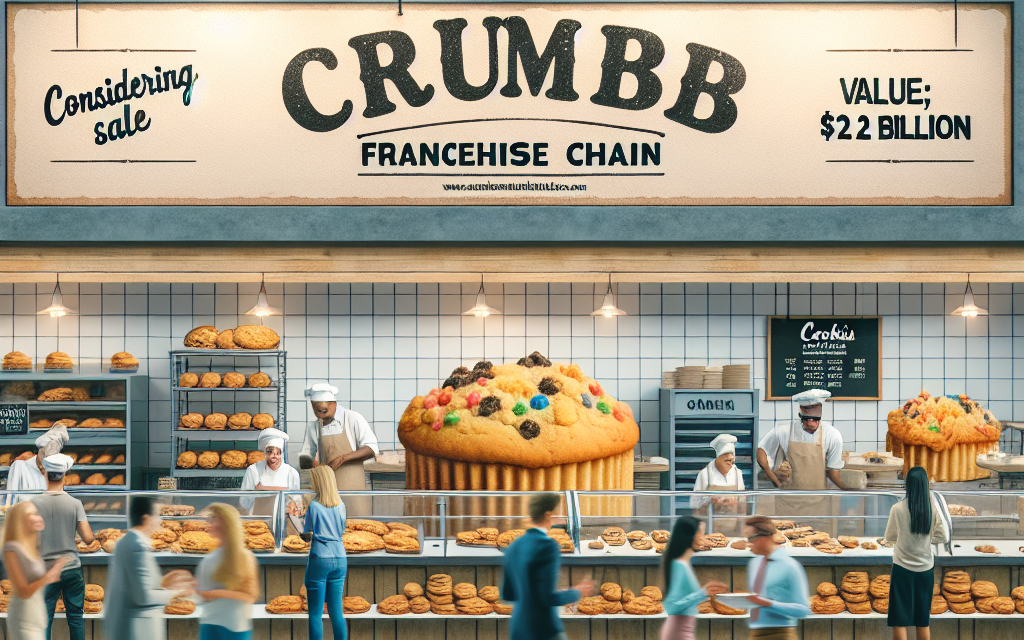“Crumbl Bakery’s Sweet Future: $2 Billion Sale on the Table!”
Introduction
Crumbl Bakery, the popular cookie franchise known for its rotating menu of gourmet cookies and innovative flavors, is reportedly exploring a potential sale valued at $2 billion. Sources indicate that the franchise, which has experienced rapid growth and widespread acclaim since its founding, is attracting interest from various investors looking to capitalize on its successful business model and expanding footprint. As Crumbl continues to dominate the dessert market with its unique offerings and customer-centric approach, the potential sale could mark a significant shift in the franchise’s trajectory and the broader bakery industry.
Crumbl Bakery’s Potential $2 Billion Sale: What It Means for Franchisees
Crumbl Bakery, known for its gourmet cookies and innovative business model, is reportedly considering a sale that could reach an impressive $2 billion. This potential transaction has sparked considerable interest among industry analysts and franchisees alike, as it raises questions about the future of the brand and its operational dynamics. For franchisees, the implications of such a sale could be profound, affecting everything from brand identity to operational support and financial stability.
As the franchise model has gained traction in the food and beverage sector, Crumbl Bakery has emerged as a standout player, attracting a loyal customer base and expanding rapidly across the United States. The brand’s unique selling proposition lies in its rotating menu of cookies, which not only keeps the offerings fresh but also encourages repeat visits from customers eager to try new flavors. However, the prospect of a sale introduces a layer of uncertainty for franchisees who have invested their time and resources into building their businesses under the Crumbl banner.
One of the primary concerns for franchisees revolves around the potential changes in leadership and corporate strategy that could accompany a sale. If the transaction proceeds, the new ownership may implement different operational practices or marketing strategies that could diverge from the established norms that franchisees have come to rely on. This shift could lead to a re-evaluation of the brand’s identity, which has been carefully cultivated over the years. Franchisees may find themselves navigating a new landscape that could impact their customer relationships and overall business performance.
Moreover, the financial implications of a sale are significant. Franchisees typically operate under a franchise agreement that outlines fees, royalties, and other financial obligations. If the ownership changes, there may be adjustments to these agreements, which could either alleviate or exacerbate the financial pressures faced by franchisees. For instance, new ownership might introduce higher royalty fees to recoup their investment, or conversely, they might offer incentives to maintain franchisee loyalty during the transition period. Understanding these potential changes will be crucial for franchisees as they assess their long-term viability within the Crumbl system.
In addition to financial and operational considerations, the emotional aspect of a potential sale cannot be overlooked. Many franchisees have developed a strong connection to the Crumbl brand, having invested not only capital but also their passion and dedication. The uncertainty surrounding a sale can lead to anxiety and apprehension among franchisees, who may worry about their future within the franchise system. It is essential for the current leadership to communicate transparently with franchisees throughout this process, ensuring that they feel valued and informed.
Furthermore, the competitive landscape of the bakery and dessert sector is evolving rapidly. As Crumbl Bakery contemplates its future, franchisees must remain vigilant and adaptable to market trends. The potential sale could open new avenues for growth and innovation, but it also necessitates a proactive approach from franchisees to ensure they remain relevant and competitive in an ever-changing environment.
In conclusion, the potential $2 billion sale of Crumbl Bakery presents both opportunities and challenges for franchisees. As they navigate this uncertain terrain, it will be crucial for them to stay informed and engaged with the brand’s leadership. By doing so, they can better position themselves to thrive, regardless of the outcome of the sale. Ultimately, the future of Crumbl Bakery and its franchisees will depend on how effectively they can adapt to the changes that lie ahead.
The Impact of a $2 Billion Sale on Crumbl Bakery’s Brand Identity
The potential sale of Crumbl Bakery, a rapidly growing franchise chain known for its gourmet cookies, for an estimated $2 billion has sparked considerable discussion regarding the implications for its brand identity. As the company contemplates this monumental decision, it is essential to examine how such a transaction could reshape its public perception, operational ethos, and overall market positioning.
Firstly, the sale could significantly alter the way consumers perceive the Crumbl brand. Established in 2017, Crumbl has cultivated a strong identity centered around quality, innovation, and community engagement. The brand’s unique selling proposition lies in its rotating menu of cookies, which not only attracts a diverse customer base but also fosters a sense of excitement and anticipation. However, a change in ownership could lead to shifts in brand messaging and marketing strategies. If the new owners prioritize profitability over the artisanal aspects that have endeared Crumbl to its customers, there is a risk that the brand could lose its distinctive charm. This potential dilution of brand identity may alienate loyal customers who have come to appreciate the company’s commitment to quality and creativity.
Moreover, the operational changes that often accompany a sale could further impact Crumbl’s brand identity. New ownership typically brings new management philosophies and operational strategies, which may not align with the original vision of the founders. For instance, if the new leadership opts for aggressive expansion or cost-cutting measures, this could compromise the quality of ingredients or the customer experience, both of which are integral to Crumbl’s brand identity. Such changes could lead to a perception of inconsistency, which might undermine the trust that consumers have built with the brand over the years.
In addition to consumer perception, the sale could also influence Crumbl’s relationships with its franchisees. The franchise model has been a cornerstone of Crumbl’s growth, allowing for rapid expansion while maintaining a level of local engagement. However, if the new ownership implements policies that prioritize corporate interests over franchisee autonomy, it could create friction within the network. Franchisees are often the face of the brand in their respective communities, and any dissatisfaction among them could lead to a decline in service quality and customer satisfaction. This, in turn, could tarnish the brand’s reputation and erode the loyalty that has been carefully cultivated.
Furthermore, the sale could have broader implications for Crumbl’s competitive positioning within the bakery and dessert market. As the company navigates the transition to new ownership, it may face increased scrutiny from competitors and industry analysts. If the sale is perceived as a sign of instability or a lack of confidence in the brand’s future, it could embolden competitors to capitalize on any perceived weaknesses. Conversely, if the sale is executed successfully and the new owners maintain the brand’s core values, it could provide Crumbl with the resources needed to innovate further and solidify its market position.
In conclusion, the potential $2 billion sale of Crumbl Bakery presents both challenges and opportunities for the brand’s identity. While the transaction could lead to operational changes and shifts in consumer perception, it also offers a chance for revitalization and growth. Ultimately, the impact of the sale will depend on how effectively the new ownership can navigate these complexities while preserving the essence of what has made Crumbl a beloved brand in the first place.
Key Players in the Crumbl Bakery Franchise Sale Negotiations
Crumbl Bakery, known for its innovative cookie offerings and rapidly expanding franchise model, has recently attracted significant attention as it considers a potential sale valued at approximately $2 billion. This development has sparked interest not only among investors but also within the broader food and beverage industry. As negotiations unfold, several key players are emerging, each playing a crucial role in shaping the future of this beloved brand.
At the forefront of these negotiations is Crumbl’s co-founder and CEO, Jason McGowan. His vision and leadership have been instrumental in the brand’s meteoric rise since its inception in 2017. Under his guidance, Crumbl has expanded to over 300 locations across the United States, captivating customers with its unique rotating menu of gourmet cookies. McGowan’s deep understanding of the franchise model and his commitment to maintaining the brand’s core values will be pivotal as he navigates discussions with potential buyers. His ability to articulate the brand’s growth potential and operational strengths will be essential in attracting serious interest from investors.
In addition to McGowan, the company’s co-founder, Sawyer Hemsley, also plays a significant role in the negotiations. Hemsley’s expertise in marketing and brand development has been vital in establishing Crumbl’s identity in a competitive market. His insights into consumer trends and preferences will be invaluable as the company seeks to position itself favorably in the eyes of prospective buyers. Together, McGowan and Hemsley represent a dynamic leadership team that has successfully cultivated a loyal customer base, making Crumbl an attractive acquisition target.
Moreover, investment firms and private equity groups are closely monitoring the situation, eager to capitalize on the brand’s growth trajectory. These financial entities bring a wealth of experience in mergers and acquisitions, and their involvement could significantly influence the outcome of the negotiations. Their expertise in evaluating business models and identifying synergies will be crucial as they assess Crumbl’s potential for further expansion and profitability. As discussions progress, these investors will likely engage in due diligence to understand the operational intricacies of the franchise, ensuring that any investment aligns with their strategic objectives.
Furthermore, franchisees themselves are key stakeholders in this process. As the backbone of Crumbl’s business model, their perspectives on the brand’s future will be essential in shaping the negotiations. Franchisees have invested not only capital but also their time and effort into building the Crumbl brand in their respective markets. Their feedback regarding operational support, marketing strategies, and overall brand direction will provide valuable insights to both the leadership team and potential buyers. Ensuring that franchisee interests are considered will be critical in maintaining the brand’s integrity and fostering a positive relationship with its franchise network.
As the negotiations for a potential $2 billion sale of Crumbl Bakery unfold, the interplay between these key players will undoubtedly shape the future of the franchise. With strong leadership at the helm, a keen interest from investors, and the invaluable input of franchisees, the outcome of this process could redefine the landscape of the gourmet cookie market. As stakeholders navigate this complex terrain, the decisions made in the coming months will have lasting implications for Crumbl’s brand identity, growth potential, and overall market presence. The unfolding narrative of Crumbl Bakery serves as a compelling case study in the dynamics of franchise sales and the intricate relationships that underpin successful business ventures.
Financial Implications of Crumbl Bakery’s $2 Billion Valuation
The potential sale of Crumbl Bakery, a rapidly expanding franchise chain known for its gourmet cookies, has sparked considerable interest in the financial implications surrounding its reported $2 billion valuation. As the company explores strategic options, including a possible sale, understanding the financial landscape becomes crucial for stakeholders, investors, and market analysts alike. The valuation reflects not only the brand’s current market position but also its growth trajectory and the broader trends within the food and beverage industry.
Crumbl Bakery’s impressive valuation can be attributed to several factors, including its innovative business model, which combines a unique product offering with a strong emphasis on customer experience. The franchise has successfully capitalized on the growing demand for gourmet and artisanal food products, positioning itself as a leader in the cookie market. This demand is further fueled by social media marketing strategies that have effectively engaged a younger demographic, driving foot traffic to its locations and boosting sales. Consequently, the brand’s ability to attract and retain customers has played a significant role in its financial success, making it an appealing prospect for potential buyers.
Moreover, the franchise’s expansion strategy has been a critical component of its valuation. With numerous locations across the United States and plans for further growth, Crumbl Bakery has demonstrated a robust ability to scale its operations. This expansion not only increases brand visibility but also enhances revenue potential, as each new location contributes to the overall financial health of the company. Investors are likely to view this growth potential favorably, as it suggests a sustainable business model capable of generating consistent returns.
In addition to its operational strengths, the financial implications of Crumbl Bakery’s valuation are also influenced by market conditions. The food and beverage sector has seen a surge in interest from investors, particularly in the wake of the COVID-19 pandemic, which has shifted consumer preferences toward comfort foods and indulgent treats. This trend has created a favorable environment for companies like Crumbl Bakery, which can leverage its unique offerings to capture market share. As a result, the franchise’s valuation may reflect not only its current performance but also the anticipated growth in consumer spending within this sector.
Furthermore, the potential sale of Crumbl Bakery at a $2 billion valuation raises questions about the future direction of the brand. If the sale proceeds, it could lead to significant changes in management, operational strategies, and even product offerings. Such changes could impact the franchise’s ability to maintain its current growth trajectory, which is a critical consideration for both existing franchisees and prospective investors. The financial implications of these changes could be profound, influencing everything from franchise fees to marketing budgets.
In conclusion, the financial implications of Crumbl Bakery’s $2 billion valuation are multifaceted, encompassing its innovative business model, expansion strategy, and favorable market conditions. As the franchise navigates the potential sale, stakeholders must remain vigilant in assessing how these factors will shape the company’s future. Ultimately, the outcome of this process will not only determine the fate of Crumbl Bakery but also serve as a bellwether for the broader food and beverage industry, highlighting the dynamic interplay between consumer preferences and business strategies in an ever-evolving market landscape.
Consumer Reactions to Crumbl Bakery’s Possible Sale
As news of Crumbl Bakery’s potential $2 billion sale circulates, consumer reactions have emerged, reflecting a mix of excitement, concern, and curiosity. Crumbl, known for its gourmet cookies and innovative flavors, has rapidly gained popularity since its inception, establishing a loyal customer base that eagerly anticipates new offerings each week. The prospect of a sale raises questions about the future of the brand and its commitment to quality, which has become synonymous with its identity.
Many consumers express enthusiasm at the thought of Crumbl expanding its reach through a sale. Supporters of the brand believe that a new ownership structure could provide the necessary resources for further growth, allowing Crumbl to open more locations and introduce new products. This optimism is fueled by the brand’s successful marketing strategies and its ability to create a community around cookie lovers. The idea that a larger entity might invest in Crumbl’s infrastructure and supply chain is appealing to those who wish to see their favorite cookie shop thrive on a national or even international scale.
Conversely, some consumers voice apprehension regarding the potential sale. Loyal patrons worry that a change in ownership could lead to alterations in the brand’s core values, particularly its commitment to quality and customer experience. Crumbl has built its reputation on fresh, high-quality ingredients and a unique customer experience, and there is a palpable fear that these elements could be compromised in the pursuit of profit. This concern is not unfounded, as many consumers have witnessed similar transformations in other beloved brands that have undergone significant changes in ownership. The emotional connection that customers have developed with Crumbl’s products makes them particularly sensitive to any shifts that could affect the brand’s identity.
Moreover, the potential sale has sparked discussions about the broader implications for the franchise model. As Crumbl Bakery has successfully expanded through franchising, many franchisees are closely monitoring the situation. They are concerned about how a sale might impact their operations, brand support, and overall profitability. Franchisees have invested significant resources into building their businesses, and any changes in corporate strategy could directly affect their livelihoods. This uncertainty has led to a mix of anxiety and hope among franchise owners, who are eager to see how the situation unfolds.
In addition to franchisees, the general public is also engaged in conversations about the future of Crumbl. Social media platforms are abuzz with opinions, ranging from speculation about potential buyers to discussions about what the sale could mean for the cookie industry as a whole. Many consumers are sharing their favorite flavors and experiences, reinforcing the brand’s community aspect while simultaneously expressing their hopes for its future. This dialogue highlights the strong emotional ties that consumers have with Crumbl, emphasizing that the brand is more than just a bakery; it is a cultural phenomenon that resonates with many.
In conclusion, consumer reactions to Crumbl Bakery’s possible $2 billion sale reveal a complex landscape of emotions. While some embrace the potential for growth and expansion, others remain cautious, fearing that the essence of what makes Crumbl special could be lost. As the situation develops, it will be essential for the brand to communicate transparently with its customers and franchisees, ensuring that the values that have endeared it to so many remain intact, regardless of the ownership structure. The future of Crumbl Bakery hangs in the balance, and its loyal customers are watching closely.
Future Growth Prospects for Crumbl Bakery Post-Sale
As Crumbl Bakery contemplates a potential $2 billion sale, the future growth prospects for the franchise chain appear promising, driven by a combination of strategic initiatives and market dynamics. The bakery, known for its gourmet cookies and innovative flavors, has carved out a significant niche in the dessert industry, attracting a loyal customer base and expanding its footprint across the United States. This expansion has been fueled by a robust franchise model that allows for rapid scaling while maintaining quality and brand integrity.
In the wake of a sale, Crumbl Bakery could leverage its newfound capital to enhance its operational capabilities and marketing strategies. With additional resources, the franchise could invest in technology to streamline its supply chain and improve inventory management. Such advancements would not only reduce operational costs but also enhance the customer experience by ensuring that popular flavors are consistently available. Furthermore, the integration of advanced analytics could provide valuable insights into consumer preferences, enabling Crumbl to tailor its offerings more effectively and respond to market trends in real time.
Moreover, the potential sale could open doors for international expansion. While Crumbl has primarily focused on the U.S. market, the global demand for unique dessert experiences presents an opportunity for growth beyond domestic borders. By entering international markets, Crumbl could tap into diverse consumer bases and adapt its menu to cater to local tastes, thereby broadening its appeal. This strategic move would not only increase brand visibility but also diversify revenue streams, making the franchise more resilient to economic fluctuations.
In addition to geographical expansion, Crumbl Bakery could explore partnerships and collaborations that enhance its brand presence. Collaborating with popular food delivery services or engaging in co-branding initiatives with other well-known brands could significantly boost visibility and attract new customers. Such partnerships would allow Crumbl to reach a wider audience, particularly among younger consumers who prioritize convenience and unique culinary experiences. By aligning with brands that share similar values, Crumbl could further solidify its position in the competitive dessert market.
Furthermore, the franchise’s commitment to innovation will play a crucial role in its future growth. Crumbl has built its reputation on offering a rotating menu of flavors, which keeps customers engaged and encourages repeat visits. This model not only fosters excitement but also allows the brand to experiment with seasonal and limited-time offerings, creating a sense of urgency among consumers. By continuing to innovate and introduce new flavors, Crumbl can maintain its competitive edge and keep its customer base intrigued.
In conclusion, the future growth prospects for Crumbl Bakery following a potential $2 billion sale are bright, characterized by opportunities for operational enhancements, international expansion, strategic partnerships, and ongoing innovation. As the franchise navigates this pivotal moment, its ability to adapt and evolve will be critical in sustaining its momentum and capitalizing on the growing demand for gourmet desserts. With a solid foundation and a clear vision for the future, Crumbl Bakery is well-positioned to thrive in an ever-changing market landscape, ensuring that it remains a beloved destination for cookie enthusiasts for years to come.
Comparing Crumbl Bakery’s Sale to Other Franchise Sales in the Industry
Crumbl Bakery, known for its innovative cookie offerings and unique business model, is reportedly contemplating a sale that could reach an impressive $2 billion. This potential transaction has sparked interest not only among investors but also within the broader franchise industry, prompting comparisons to other notable franchise sales. Understanding the dynamics of these transactions can provide valuable insights into the factors that influence franchise valuations and the overall market landscape.
When examining Crumbl Bakery’s potential sale, it is essential to consider the recent history of franchise sales in the food and beverage sector. For instance, the acquisition of Dunkin’ Brands by Inspire Brands for approximately $11.3 billion in 2020 serves as a significant benchmark. This transaction highlighted the growing appetite for established brands with a loyal customer base and a proven business model. Similarly, the sale of Wingstop to a private equity firm for $1.4 billion underscored the increasing value placed on franchises that demonstrate strong growth potential and adaptability in a competitive market.
In contrast to these larger transactions, Crumbl Bakery’s valuation reflects its unique position within the industry. The brand has rapidly expanded its footprint, boasting hundreds of locations across the United States in just a few years. This growth trajectory is reminiscent of other successful franchises, such as Jersey Mike’s Subs, which saw its valuation soar following a series of strategic expansions and marketing initiatives. The ability to scale operations while maintaining product quality and customer satisfaction is a critical factor that can significantly enhance a franchise’s market value.
Moreover, the rise of consumer preferences for artisanal and gourmet food options has played a pivotal role in shaping the franchise landscape. Crumbl Bakery’s focus on high-quality ingredients and creative flavor combinations aligns with this trend, making it an attractive prospect for potential buyers. This shift in consumer behavior mirrors the success of franchises like Sweetgreen, which capitalized on the demand for fresh, healthy dining options. As such, Crumbl’s emphasis on quality and innovation positions it favorably in the eyes of investors looking for growth opportunities in the food sector.
Additionally, the impact of the COVID-19 pandemic on the franchise industry cannot be overlooked. Many franchises faced unprecedented challenges, yet those that adapted quickly to changing consumer habits emerged stronger. For example, the surge in demand for delivery and takeout options has led to increased valuations for franchises that effectively leveraged technology to enhance customer experience. Crumbl Bakery’s ability to pivot and embrace these trends has likely contributed to its current valuation and attractiveness as a potential acquisition target.
In conclusion, the potential $2 billion sale of Crumbl Bakery is a significant development within the franchise industry, drawing parallels to other high-profile transactions. By examining the factors that have influenced past franchise sales, it becomes evident that Crumbl’s unique business model, rapid growth, and alignment with consumer trends position it as a compelling opportunity for investors. As the franchise landscape continues to evolve, the outcome of Crumbl’s deliberations may not only impact its future but also serve as a bellwether for the broader industry, reflecting the ongoing demand for innovative and adaptable brands in the marketplace.
Q&A
1. **What is the current status of Crumbl Bakery?**
Crumbl Bakery is reportedly considering a sale valued at $2 billion.
2. **Who is involved in the potential sale of Crumbl Bakery?**
Sources indicate that the company is exploring options for a sale, but specific buyers have not been disclosed.
3. **What is the reason behind Crumbl Bakery’s consideration of a sale?**
The reasons for the potential sale have not been publicly detailed, but it may involve strategic growth or financial considerations.
4. **How has Crumbl Bakery performed in recent years?**
Crumbl Bakery has experienced significant growth, expanding its franchise locations rapidly across the United States.
5. **What is the franchise model of Crumbl Bakery?**
Crumbl Bakery operates on a franchise model, allowing individual owners to open and operate their own locations under the Crumbl brand.
6. **What are the popular products offered by Crumbl Bakery?**
Crumbl Bakery is known for its gourmet cookies, which are offered in a rotating menu of flavors.
7. **What impact could a sale have on Crumbl Bakery’s operations?**
A sale could lead to changes in management, strategy, and potentially the expansion of the brand, depending on the new ownership’s vision.
Conclusion
Crumbl Bakery’s consideration of a $2 billion sale highlights the brand’s significant growth and popularity in the fast-casual dessert market. This potential transaction reflects the increasing interest in franchise opportunities within the food industry, driven by consumer demand for unique and high-quality offerings. The sale could provide the company with the capital needed for further expansion and innovation, while also presenting an attractive investment opportunity for potential buyers looking to capitalize on the booming dessert sector.





